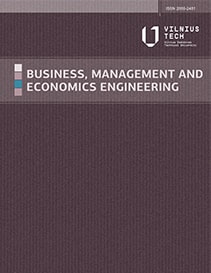Towards Poverty Alleviation for the Base of Pyramid: Social Business Model in Urban Low-Cost Housings
Towards Poverty Alleviation for the Base of Pyramid: Social Business Model in Urban Low-Cost Housings
Author(s): Mohammed Ali Berawi, Perdana MirajSubject(s): Developing nations, Family and social welfare, Economic development, Socio-Economic Research
Published by: Vilnius Gediminas Technical University
Keywords: developing countries; feasibility; housing; poverty; social business model; sustainability;
Summary/Abstract: Purpose – this study investigates alternative a small-scale social business model that potentially generate sustainable income for households at the base of the pyramid. A comparison of two low-cost housings that have a different geographical condition and local characteristics is examined. Research methodology – this research adopted two-stage approach to address the research objective. A pairwise comparison was employed to evaluate alternatives based on selected criteria for decision-making. In the second stage, the proposed business model was assessed by taking into account investment, processing cost, and revenue. Findings – the findings of this research suggest suitable business model that combine profit orientation and facilitates social mission in urban settings. The business model offers attractive financial feasibility from the investor viewpoint and simultaneously engages low-income households to improve their prosperity level leaving the base of the pyramid (BOP) status. Research limitations – this paper is not involving division of responsibility between stakeholders in low-cost housing and BOP sector. This study also not discussed how social entrepreneurs play a role in the social business model. There is a need to further investigate how the impact of social entrepreneurs on this model and engage collaboration with interest parties to engage community development. Practical implications – the findings recommend strategies that can be used by policy-makers and other related stakeholders to scale-up the business model, empower more low-income households, and create new job opportunities for urban poor. The findings of this research also indicate social business model that enables households at the BOP to earn sustainable income and release their current poverty status. Originality/Value – the research is one of the few studies that explored alternatives to social business models available for urban poor by taking into account project feasibility. No previous research has been attempted to consider both pairwise comparison and life cycle cost approach in the development of social business models. This research can be found useful for those with similar issues not only in emerging economies but also in developed countries.
Journal: Business, Management and Economics Engineering
- Issue Year: 21/2023
- Issue No: 1
- Page Range: 169-189
- Page Count: 21
- Language: English

